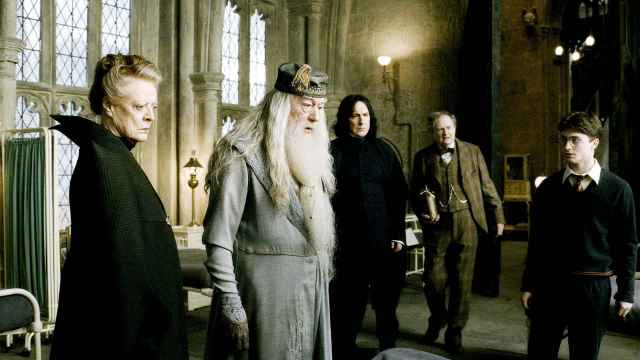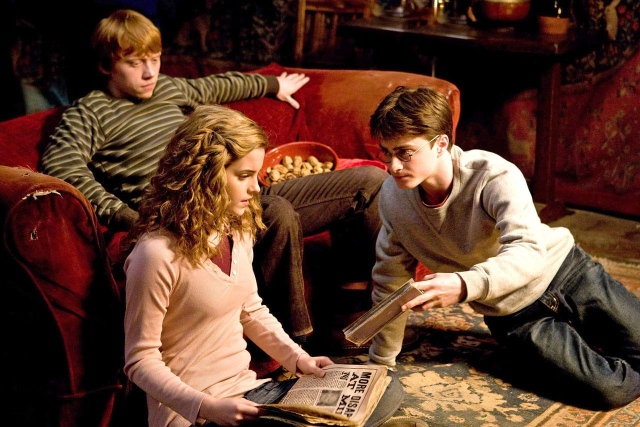 It’s been 10 years this summer since I read the first six Harry Potter books for the first time. I’ve spent much of the last 10 years reading literary criticism, folklore, mythology and famous works of literature that were an acknowledged influence on J. K. Rowling’s opus in the hopes of answering the question, “What made these books so successful?” So naturally at this point I have a lot of opinions, and today I share them with you.
It’s been 10 years this summer since I read the first six Harry Potter books for the first time. I’ve spent much of the last 10 years reading literary criticism, folklore, mythology and famous works of literature that were an acknowledged influence on J. K. Rowling’s opus in the hopes of answering the question, “What made these books so successful?” So naturally at this point I have a lot of opinions, and today I share them with you.
1. Clear and Engaging Prose
One of Rowling’s less appreciated skills is her gift for crafting prose with complete clarity, so that even a young reader can follow the narrative and understand what’s going on at a given moment. Pick up any number of other kid’s lit books and you may find your attention drifting by the second or third page, but Rowling manages to make the story immediately and endlessly compelling.
2. Instantly Memorable Characters
One reason we find the story so compelling is because already in the opening pages we’re beginning to identify and sympathize with characters who at this point are little more than thinly sketched types. Hagrid with his hands the size of trash can lids, Dumbledore with his half-moon spectacles and long flowing robes—she creates a distinct visual language for each character. But then she has the character do or say something that instantly establishes his or her personality. Dumbledore takes a mysterious object out of his pocket and dims all the street lamps, solidifying for the rest of the series that he is wise, magical, and powerful. Hagrid is fierce but bumbling. Percy is pretentious. Malfoy is arrogant. We know these things about them from the moment we meet them, and we never forget.
3. They Take the Emotions of Children Seriously
This summer I’ve been reading Chamber of Secrets and making note of every time Rowling describes a character’s emotional state, whether by stating directly what he or she is feeling, or, what is more common, by using a visual shorthand to suggest feelings without actually stating them outright. (The huge vein in the middle of Uncle Vernon’s head pulses; Ginny blushes red to the roots of her flaming hair). I’m finding that what keeps the early books from being treacly stories about an orphaned young wizard is the way they radiate concern for the inner world of children and their real-life emotional crises. In the first three chapters of Chamber of Secrets Harry feels hungry, panicky, embarrassed, angry, isolated, confused, scared—and this is all the more remarkable because in terms of actual story, not a lot has happened yet. By keeping relatable feelings front and center, Rowling makes the more fanciful parts of the story believable in a way they wouldn’t be otherwise.
4. They Raid the Treasuries of Past Literature
In the late 1990s one of the most common criticisms lodged against the Harry Potter books—aside from their being the gateway to hell—was that they were derivative of earlier works. The Worst Witch series portrayed young witches and wizards coming of age in a boarding school setting. The Sword in the Stone told of a boy king in training under a wise and powerful older wizard. Neil Gaiman had even written a comic about a bespectacled young magician with dark hair and a pet owl.
But these criticisms largely missed the point. It’s true, the basic, thumbnail premise of the Harry Potter series is indebted to earlier fairy-tales and kid’s novels. That’s part of what makes it instantly recognizable, and therefore accessible to young readers. But as the series matured, it incorporated influences from throughout the Western canon, including the novels of Austen, Dickens and Dostoevsky, the tragedies of Shakespeare and Aeschylus, and the fantasies of Lewis and Tolkien. Rowling borrowed character names (Ms. Norris), relationships (Harry’s relationship with his horrible aunt and uncle comes straight out of Hard Times), and major plot points (Harry returning Cedric’s body to his parents was consciously modeled on Homer) to create a story that works precisely because it assimilates so many previous stories.
Mythical and Alchemical Imagery Creates a Sense of Wonder
What initially drew me to study how the Harry Potter books were written was author John Granger’s assertion that the books are full of alchemical imagery, and in fact follow a standard alchemical narrative structure. He maintained that this imagery resonates with readers on a subconscious level. Rowling herself has admitted to studying alchemy while planning the series. Sometimes the influence of ancient and medieval texts on the story is obvious (the four tasks of the Triwizard Tournament are modeled on the four elements) and sometimes it’s more subtle: virtually everything that happens to Dumbledore at the end of Half-Blood Prince has antecedents in alchemical texts where a king drinks a green liquid and cries out in the darkness for help, but is not rescued. He dies, but is revived in the light of dawn in the form of a phoenix.
Ritual, Tradition, Place
Reading the Harry Potter books awakened in me a fascination with specific places and their folklore, festivals, customs and traditions. A huge but overlooked source of the series’ appeal is the way it invites readers into a community with a rich history and a series of rituals that are reenacted year after year (the Sorting ceremony, the Halloween feast, the end-of-term banquet). In this the series mimics the Christian church calendar, but with a contemporary secular gloss (the boarding school story with its seasonal rhythms) that conceals its medieval underpinnings. In doing so the stories give readers a sense of belonging that is sorely lacking in our rootless era.

They Offer an Escapist Hang-out Fantasy…
Half the joy of watching a movie like Ocean’s 11 or Joss Whedon’s Much Ado about Nothing is seeing characters or actors we recognize hanging out in a location most of us don’t have the luxury of enjoying on a daily basis. Viewing the story becomes an act of participation for the audience as we imagine ourselves luxuriating in immense wealth amid gorgeous scenery. Rowling understands the appeal of this, which is why the stories are only secondarily about Harry’s war against Voldemort. The best book in the series, Harry Potter and the Order of the Phoenix, reads like a year at Hogwarts unfolding in real time, creating memories for readers that are sometimes just as emotionally vivid as their actual experiences of growing up.
… But Then Raise the Stakes to Keep the Pages Turning
But having said that, the series would lose readers’ attention if all they offered was the chance to hang out with characters we love in a sweet castle. (Enid Blyton’s Malory Towers series, another obvious inspiration on the books, tried this with some success in the ‘50s but is largely forgotten today). To keep us engaged, the author must get us worried about her characters, and this Rowling does from the opening pages, in which Harry’s mother and father are murdered, essentially, by a notorious serial killer. This bracing sense of danger and menace pervades even the supposedly “lighter” and more whimsical earlier books, which contain some of the series’ darkest and most grotesque imagery. By keeping her fantasy grounded in a realistic story of assassins, child predators, escaped prisoners and sadistic elders, Rowling gave us a world where the joy of discovery is perpetually shadowed by the fear of depression, insanity, isolation, torture and death. The knowledge that any or all of these things could happen to Harry and his friends (and that Rowling would not spare them) kept the pages turning long into the night.
Lastly, magic. 😀
… and magic!
The best stories are vitally connected to the “true story” and that is profoundly true of Harry Potter. I think it was C.S Lewis who said that God has a way of planting images into the great literature of each age. The image of the Grail in medieval literature was one such. Harry Potter is full of such images. This, added to the great skill that Joanna Rowling has as a story teller and which you describe so well, means that they go far beyond the scope of the literati (much to their chagrin!) and the scope of the writers of pulp fiction (much to theirs as well!). It was a joy to share them with my children over the decade in which they were published and I believe they will be force for good in the shaping of their adult lives as well.
I’ve only just begun reading the Harry Potter series. They’re delightful so far. Just think, I could have read them years ago and known what my friends were talking about. I could have joined in the conversations instead of sitting there clueless. I missed some good times.